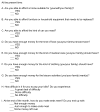The financial impact of immunosuppressant expenses on new kidney transplant recipients
- PMID: 18673373
- PMCID: PMC2592494
- DOI: 10.1111/j.1399-0012.2008.00869.x
The financial impact of immunosuppressant expenses on new kidney transplant recipients
Abstract
Background: This study aimed to examine kidney transplant recipients' ability to afford transplant-related out-of-pocket expenses and the financial impact of these expenses on their lives.
Patients and methods: This cross-sectional study involved 77 kidney recipients. Variables analyzed were: ability to afford daily necessities; impact of immunosuppressant expenses on patients' lives; awareness of Medicare support terminating three yr post-transplant; and strategies used to pay for out-of-pocket transplant expenses. The Economic Strain Scale measured financial strain.
Results: Twenty-nine percent of kidney recipients experienced financial strain. Poor, less educated, and younger patients were more likely to report financial strain. Out-of-pocket expenses relating to kidney transplantation adversely affected patients' ability to afford leisure activities (35%), a house (27%), and a car (26%). Thirty-one percent reported that immunosuppressant expenses have had somewhat to great (adverse) impact on their lives. Of those on Medicare and not disabled (n = 41), 51% were unaware Medicare coverage will terminate and 71% did not know how long coverage lasts.
Conclusions: Financial strain presents a considerable risk to kidney recipients' ability to purchase immunosuppression. Socioeconomic disparities in recipients' financial strain may be a source of disparities in graft survival. Transplant professionals should better inform transplant candidates about financial consequences of transplantation.
Figures
References
-
- Colm CM, Pascual M. Update in renal transplantation. Arch Intern Med. 2004;164:1373. - PubMed
-
- Butkus DE, Mayedrech EF, Raju SS. Racial differences in the survival of cadaver renal allografts – Overriding effects of HLA matching and socioeconomic factors. N Engl J Med. 1992;327:840. - PubMed
-
- Koyama H, Cecka JM, Terasa PI. Kidney transplants in black recipients: HLA matching and other factors affecting long-term graft survival. Transplantation. 1994;57:1064. - PubMed
-
- Kasiske BL, Cohen D, Lucey MR, Neylan MD. Payment for immunosuppression after organ transplantation. JAMA. 2000;283:2445. - PubMed
-
-
Social Security Amendments of 1972, Pub. L. No. 92–603, 86 Stat. 1329 (1972). Section 2991, October 30, 1972.
-
Publication types
MeSH terms
Substances
Grants and funding
LinkOut - more resources
Full Text Sources
Medical



